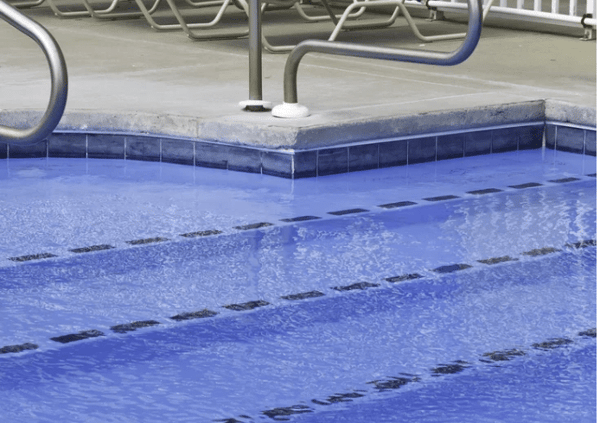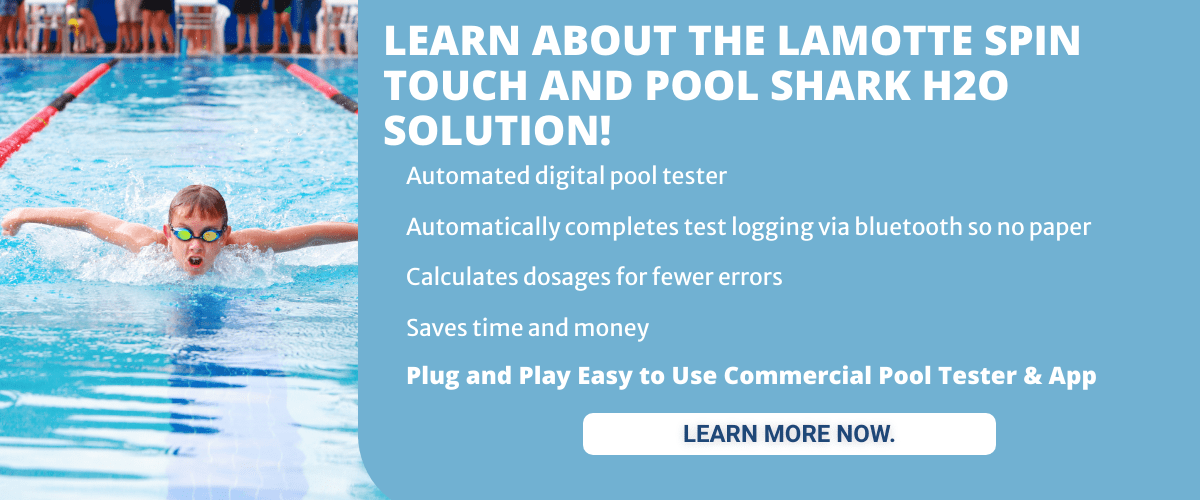With saltwater pools becoming more and more popular on commercial properties, it is important that we know how to properly care for them. Believe it or not, they are not much different from a traditional chlorine pool. Let’s chat about it!

How Saltwater Pools Work
Saltwater pools require a salt cell and a salt board and, of course, salt. You can’t just dump a bunch of salt in the water without first having a salt system installed. As the water passes through the salt cell, which is plumbed into the equipment line, a process called electrolysis occurs and the salt is converted to a chlorine gas. Chlorine gas is hypochlorous acid and sodium hypochlorite. This gas is what sanitizes the swimming pool water. So a salt pool is still a chlorine pool. You are just making your own. We, as pool operators know this, but you would be surprised at how many homeowners do not.
Testing Your Saltwater Pool
We still need to test the water just as often with a saltwater pool. In some regions, this can be once a day or even as often as once every hour! It all depends on your local health department regulations. There are many ways to test water. There are tablet test kits, reagent test kits, digital testers and spin lab testers. Test strips are not allowed to be used to test a commercial body of water. My favorite is the spin lab. Especially if you have the Pool Shark H2O App. If paired with the LaMotte Spin Lab, you can literally get water test results sent to any and all devices you have the Pool Shark H20 App on in just 60 seconds! Not ready to jump on board with the spin lab? That is quite alright. You can still manually enter your test results into your Pool Shark H2O App and get accurate dosing instructions. After all, what good are water test results if we don’t know what to do with them?
The Pool Shark H2O App uses the Langelier Saturation Index to properly dose your body of water. Unlike other apps, you only need to enter the body of water’s volume and sanitizer once. Water can either be neutral, corrosive, or scale-forming. With 0 being neutral, we want to try to keep the water 0.15 points in either direction.
Salt Water Pool pH and Alkalinity
The chlorine gas that the salt system produces is very basic so you will find yourself with a higher pH and alkalinity than you would in a pool that uses tablets. This can push our water to be scale-forming so you may find yourself going through more acid. pH ideally should be around 7.5 and alkalinity between 80-120, but these may need to be adjusted to balance the LSI. We do not worry about pH and alkalinity any less in a saltwater pool. We probably worry about it more because calcium build-up around the edges of the pool, in the plumbing and in the salt cell is bad. Too much calcium build-up within a cell can damage the plates and this would not be covered by warranty.
Salt Water Pool Cyanuric Acid
We still need to protect the chlorine that our salt system is making so you’ll want to have a reserve of cyanuric acid. I usually recommend keeping the cyanuric acid at around 40 ppm-50 ppm for all of my salt pools.
Salt Water Pool Calcium Hardness
We still need to keep enough, but not too much, calcium hardness in our commercial bodies of water. This doesn’t change just because we have a saltwater pool. Like I said, caring for a salt pool really isn’t that much different than caring for a traditionally chlorinated swimming pool.
Salt Water Pools - Cleaning the Salt Cell
Saltwater pools do give us one more thing to add to our to-do list. Salt cells should be inspected every 3 months to see if they need to be cleaned. You clean a salt cell with a 4 to 1 mixture of muriatic acid. They make special stands to assist with this for all of the major salt cell brands. We don’t want to clean too often, but we don’t want too much build-up to occur either. The Pool Shark H2O App has custom checklists and can help you stay organized with tasks like this, filter cleans etc.
Salt Water Pools - Maintaining the Salt Level
Salt does not evaporate, but can be reduced by splash out. You’ll want to invest in a digital salt tester to make sure there is always enough pool salt in the water to meet your specific brand’s salt requirements. Most can range between 3,200-4,200 ppm of salt. Check your manufacturer’s handbook for exact requirements.
Salt Water Pool Logs
We still need to keep logs of our water tests on a saltwater swimming pool. The Pool Shark H2O App keeps all your water test logs safe and dry with their modern technology digital logging system. Gone is the need for old-fashioned paper log books. Think of all of the storage space you will save! You can access these logs remotely which can be hugely beneficial if you are not always onsite.
So, salt water pools aren’t that different, really. See you poolside!
More Commercial Pool Chemistry Resources
Free, vs Combined vs Total Chlorine - A Guide for Commercial or Public Pool Operators
Chlorine Shock vs Non-Chlorine Swimming Pool Shock
Why Being Able to Calculate the Volume of a Commercial or Public Swimming Pool is Important
Cyanuric Acid Levels in Swimming Pools
Ideal Alkalinity in Commercial Pools
Managing pH and Alkalinity in Pools
Commercial Pool Chlorine Management
Cyanuric Acid in Your Pool Too High? How to Remove Cyanuric Acid (Lower Pool Stabilizer)
Lowering Alkalinity in Swimming Pools
Reasons Your Public or Commercial Pool Water Could Be Cloudy
Muriatic Acid in Swimming Pools
How to Lower pH in Pools, Water Parks and Water Features
Does Chlorine Kill Poop in a Swimming Pool?
Total Dissolved Solids: When Should I Drain My Pool?
Why Pool Chemical Storage Cabinets are Important for Commercial Pools
Storing Pool Chemicals: What Commercial Pool Operators Need to Know



